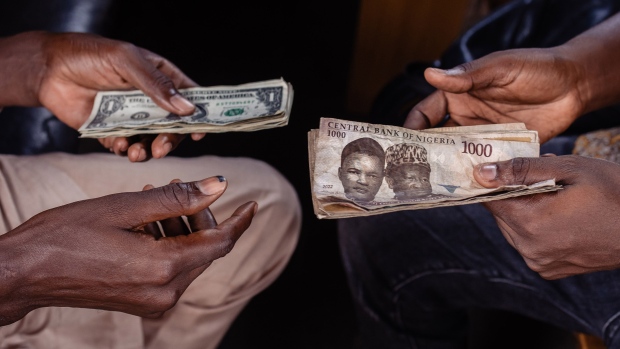Nigerian Firms Slim Down Dollar Debt as Naira Hits Another Low
Lagos-based investment bank, Afrinvest West Africa predicts the naira may further fall to 1,700-1800 naira per dollar before year-end, said analyst Nathanael Disu, as dollars remain locally scarce.
- Advertisement -
Nigeria’s naira struck a fresh low against the dollar as businesses in the West African nation sought to reduce their exposure to the US currency amid expectations the local unit will continue to suffer.
The naira slipped more than 8% on Wednesday to 1,699 per dollar, according to FMDQ data compiled by Bloomberg, as greenback supply on the Nigerian market almost halved to $176 million.
- Advertisement -
Lagos-based investment bank, Afrinvest West Africa predicts the naira may further fall to 1,700-1800 naira per dollar before year-end, said analyst Nathanael Disu, as dollars remain locally scarce.
- Advertisement -
That gloomy outlook is prompting companies with dollar debt to reduce it if they can, despite much higher borrowing costs in naira, thwarting President Bola Tinubu’s goal when he relaxed currency controls last year to attract more foreign capital to Nigeria.
“One is still seeing volatility on the naira, so there’s still limited confidence in the currency,” said Muyiwa Oni, an analyst at Stanbic IBTC Bank Plc. “The biggest point is that as an institution you can’t control naira movement, but you can mitigate your risks.”
Nigerian Breweries, a unit of Heineken NV, announced plans on Sept. 9 to repay foreign debt of 328
A few days later, Ecobank Nigeria said it would convert as much as $200 million in dollar loans to naira to reduce currency risk. The unit of Togo-based Ecobank Transnational Inc also reported 77% decline in pre-tax profit that it blamed on naira depreciation.
- Advertisement -
In July, MTN Group’s Nigeria unit, the country’s biggest mobile operator, said it had reduced letters of credit obligations to $100 million from $417 million in December.
Naira woes have already prompted multinationals including Unilever Plc, Procter & Gamble Co., GSK Plc, Sanofi SA and Diageo Plc to announce in recent months that they are either reducing their Nigerian exposure or exiting completely by selling to local firms.
Such moves reflect doubt that things will soon improve. A poll of 1,600 firms by the central bank in August showed businesses expect the naira to weaken for the rest of 2024, though they expect it to pick up next year.
As Africa’s largest oil producer, lower prices for crude weigh heavily on the currency.
Citigroup Inc.’s chief Africa economist David Cowan forecasts more naira weakness after oil prices fell almost 17% in the third quarter, though Middle East tensions have lifted Brent crude by several dollars from recent lows.
The currency’s problems are complicating Tinubu’s efforts to kick-start tepid growth in Africa’s most populous nation. In addition to allowing the naira to float more freely after years of being held at an artificially strong level against the dollar, he also partially removed fuel subsidies that cost the nation $10 billion in 2022.
The reforms were welcomed by international observers but contributed to a cost-of-living crisis as inflation surged to a 28-year high. That provoked public demonstrations in early August, leading to a crackdown by security forces in which at least 21 people died.
- Advertisement -


